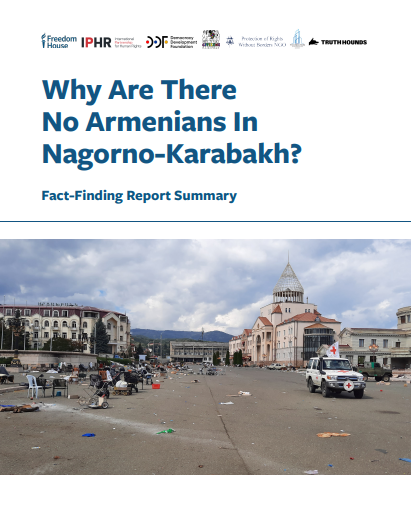The Helsinki Citizens’ Assembly Vanadzor Office and a number of human rights organizations have prepared the REPORT “Why Are There No Armenians in Nagorno-Karabakh?”
The report presents the situation of ethnic Armenians living in Nagorno-Karabakh from the end of the Second Nagorno-Karabakh War in 2020 until the military offensive of the Azerbaijani regime in September 2023, as well as its consequences. The report reveals numerous gross violations of human rights, international humanitarian law, and international criminal law committed by the Azerbaijani authorities against the ethnic Armenian population of Nagorno-Karabakh. These include extrajudicial killings, a months-long blockade, forced displacement, as well as a policy of cultural erasure and destruction of property after displacement.
The documentary evidence meets the definition of ethnic cleansing set out by the UN Commission of Experts in the context of the former Yugoslavia. The fact-finding report confirms that the actions documented in Nagorno-Karabakh constitute war crimes and crimes against humanity.
Key findings include:
The Azerbaijani state’s actions constitute ethnic cleansing and are being carried out through forced displacement. It has operated in a comprehensive, methodically implemented strategy to empty Nagorno-Karabakh of its ethnic Armenian population and historical and cultural presence. The documentary evidence meets the criteria for ethnic cleansing set out in the report of the UN Commission of Experts investigating violations of international humanitarian law in the former Yugoslavia in the early 1990s.
The displacement of 100,000 ethnic Armenians in September 2023 was the culmination of an intensive, years-long campaign. This campaign by the Azerbaijani state included widespread human rights violations against the ethnic Armenian population in various forms, using prolonged tactics of intimidation and blockade. Such actions made it impossible for the ethnic Armenian population of Nagorno-Karabakh to live in safety and dignity.
The rights and freedoms of the ethnic Armenian population have been repeatedly violated. Fact-finding has documented violations of the residents’ rights to life, health, food, freedom of movement, adequate living conditions, liberty and personal integrity, education, and property. Cultural rights have also been violated. Ethnic Armenians have also been subjected to violations of their rights to be free from torture and ill-treatment. The perpetrators have deliberately killed civilians, even in the presence of peacekeepers, and have enjoyed complete impunity. This has further deepened the insecurity and climate of fear among the population, leading up to the mass displacement that took place in September 2023.
Violations continue in Nagorno-Karabakh, in the form of the erasure of the Armenian cultural and historical presence. This includes the planned or already implemented destruction of Armenian cultural monuments, churches, cemeteries and residential areas.
The report outlines a number of steps that democratic governments can take to combat impunity. These recommendations include:
Urge accountability for acts of impunity. Support international efforts to prosecute crimes against humanity and war crimes committed against the population of Nagorno-Karabakh, including through state referral to the International Criminal Court (ICC). Implement targeted sanctions, such as travel bans and asset freezes, against Azerbaijani officials, military leaders and individuals involved in gross human rights violations and war crimes.
Protect the rights of displaced ethnic Armenians. Urge the Azerbaijani state to create conditions for the safe and voluntary return of displaced Armenians to Nagorno-Karabakh, with strong security guarantees and guarantees of non-discrimination. Support initiatives that protect the rights of forcibly displaced persons and support the implementation of strong legal protection and assistance services. Ensure that the voices of affected populations are heard and their rights are protected in all relevant international forums.
Protect Armenian cultural heritage. Urge Azerbaijan to uphold international standards for cultural preservation and prevent further destruction or alteration of Armenian cultural assets. Encourage Azerbaijan to cooperate with the United Nations Educational, Scientific and Cultural Organization (UNESCO) and other relevant bodies to support the implementation of independent monitoring missions and to promote international dialogue for the protection and restoration of these sites.
The fact-finding mission was organized by the Helsinki Citizens’ Assembly Vanadzor Office, Freedom House, “International

